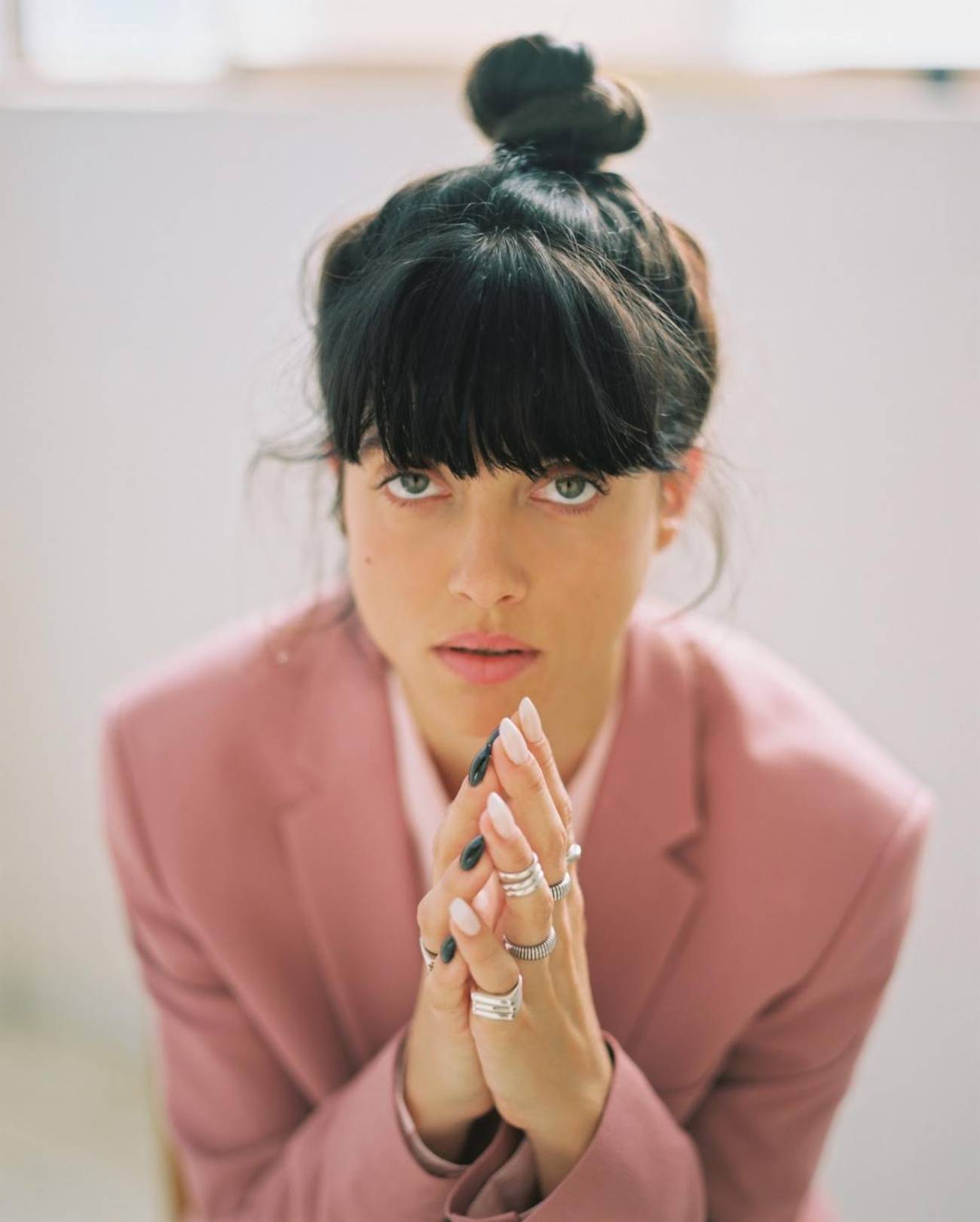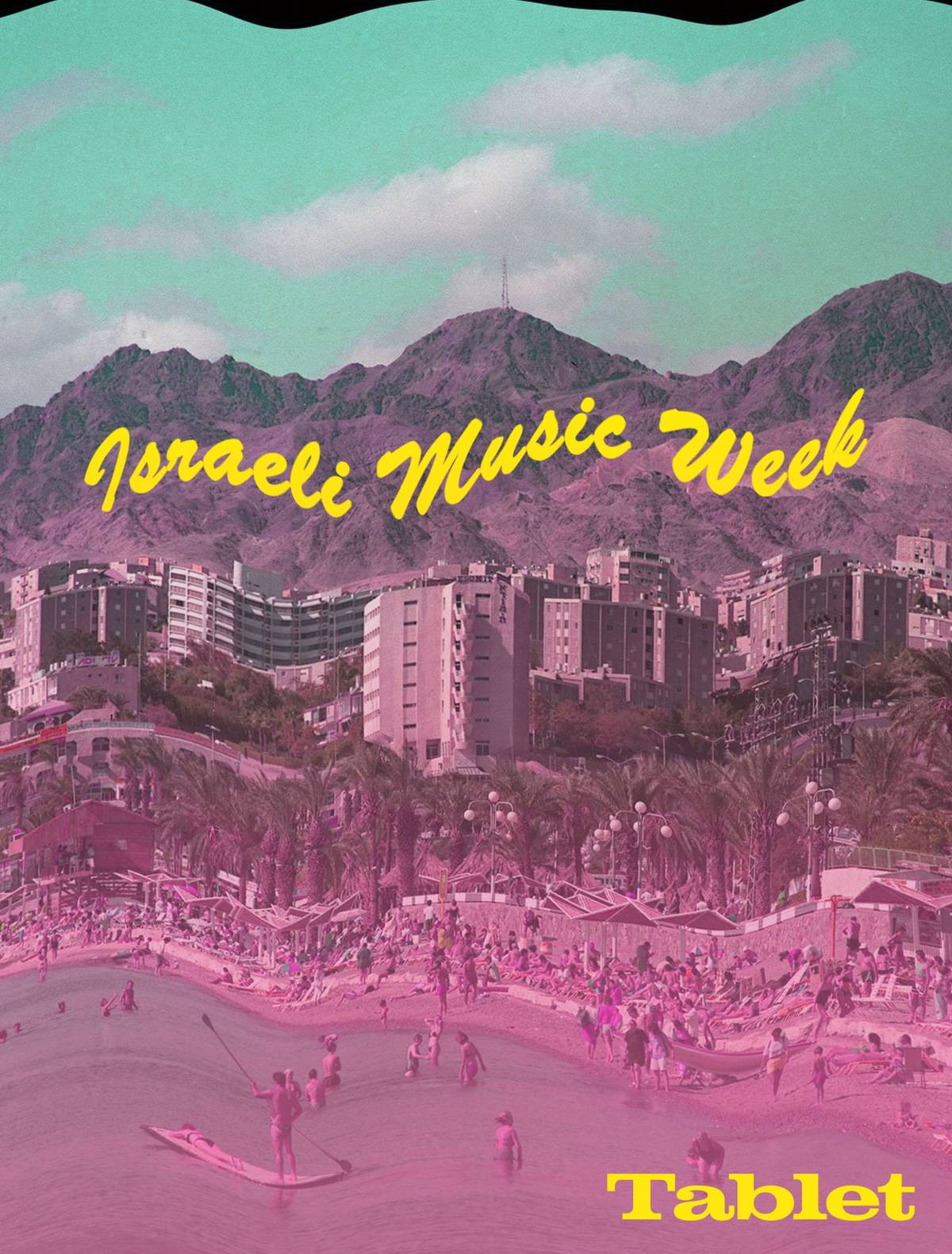Noga Erez Is Out of Quarantine
With a coveted Billie Eilish endorsement in her pocket, Israel’s leading indie artist arrives in the States this month for her American festival debut




Noga Erez—Israel’s prime indie export of recent years—is ready for world domination. With versatile and ever-changing vocals, she angrily raps and seductively purrs over the synths and beats of her electro-pop, which is as moody as it is catchy.
At the end of March, Erez released her second album, Kids, made with her creative and life partner Ori Rousso. In mid-April, her international career went up a notch further when she performed the single “Views,” off the album, on Jimmy Kimmel Live! Of course, the times being what they are, it wasn’t a live performance in the studio; the bit was actually pre-recorded as part of an Israeli virtual concert series The Succulent Sessions, which explains why Erez, Rousso, and their band performed the song in a room full of houseplants.

Kids is a pop/hip-hop album, dancey and playful in a pretentious kind of way. Stylistically, the album is situated between OutKast, M.I.A., and Billie Eilish, with an added affectation of Radiohead-like proportions. Miss Eilish herself is a fan. Billie namechecked Erez on a podcast, and her no-less-famous brother and creative partner, Finneas O’Connell, posted a story on Instagram declaring that Kids is “one of the best albums he’s ever heard.” Gal Gadot recently posted a video of her and her daughter dancing to Erez’s song “End of the Road” on Instagram, in an act of Israeli-sisterhood.
But it is not only millennials and Zoomers who fell in love with Erez. Veteran British hip-hop writer Neil Kulkarni wrote in The Quietus that “you won’t hear a better pop album this year. I doubt you’ll hear a better rap album this year.” Here, he makes an interesting point: Erez uses hip-hop “not to prove anything authentic, but as a collage method of crafting the most compelling pop.” In other words: Hip-hop has conquered pop. And anyone can make hip-hop nowadays and get away with it—even a Jewish girl from Caesarea.
Israeli musicians who “made it” abroad are few and far between. The list includes Esther Ofarim in the ’60s, Mike Brant in the ’70s, Ofra Haza in the ’80s, and more recently Asaf Avidan. Some of them made it in Europe but never broke into the United States. Some others made it big in specific scenes, far away from the mainstream—Israelis like Infected Mushroom, Skazi, and Vini Vici conquered the Trance scene; Orphaned Land are huge in the metal world; Monotonix were big in the indie rock scene.
Many Israeli musicians dream of succeeding outside of Israel. It seems that Noga Erez is now on the brink of joining this list. If she does, and if she actually goes mainstream in the U.S., it would be an extraordinary feat even for the short list of Israeli musicians with crossover American appeal. Ofra Haza’s “Im Nin’alu” was a dance floor hit in the States during the late ’80s, but it was still stylistically ethnic, a world-music-dance hybrid. Erez’s proposition is very different, as her music is contemporary Western international pop. In fact, if you don’t dive deep into her lyrics, you wouldn’t know she’s Israeli. Her accent obviously isn’t British or American, and it has a tinge of something exotic, but you can’t place her. She could be from anywhere. But if she does make it, she’ll be an Israeli girl beating the Western pop world at its own game.
Erez was born in the ancient city in north-central Israel 31 years ago. In the army, she was part of a military band. Afterward she studied at the Jerusalem Academy of Music and Dance, joined an indie-folk band called The Secret Sea, dabbled in jazz, and finally opted for an electronic sound. She signed with the trendy indie label City Slang, which is based in Berlin. In 2017, she released her debut album, Off the Radar, which was darker and less pop-oriented than Kids. A song off the album, “Dance While You Shoot,” was used by Apple in an advertising campaign for its music streaming service (almost a decade after the French-Israeli singer Yael Naim rose to fame after a song of hers was featured in an Apple ad.)
Propelled by their string of successes abroad, Erez and Rousso started working on Erez’s second album. They finished it in 2019 and planned to tour it in the United States with a number of big festival dates, but then COVID-19 struck, the couple stayed at home in Israel, and, instead of touring, reopened the mixes of the second album to continue refining it. Rather than viewing the pandemic as a setback, they were actually grateful for the extra time. Instead of promoting her new album on the road—as musicians usually do—Erez did so with two livestreamed shows, full of dancers, at the beginning of April. Now that the COVID situation is calming down a bit, she is finally embarking on her KIDS world tour with 47 live dates scheduled across Europe and the U.S., including her U.S. festival debut at Chicago’s Lollapalooza on Aug. 1.
If you don’t know Noga Erez, she’s easy to recognize. Her signature look du jour includes a messy bun and bangs and a chic pantsuit. Sometimes the suits are well-fitted, other times they are comically oversized, reminiscent of David Byrne in Talking Heads’ Stop Making Sense concert film. On the cover of the Kids album, she sits cross-legged on the floor in her enormous suit jacket.
Erez is unapologetically ambitious. She takes herself very seriously, never smiling in videos (the new album is peppered with soundbites of Noga’s mother, one of which is her telling her daughter that she needs to smile more). I might have detected a cynical smirk in one of her videos, but generally, she opts for a distant icy stare. She oozes cool confident swagger and defiance, which is useful, considering her unabashed pretension in tackling the big issues.
“These are songs about what we inherit from past generations, how we pass things on,” Erez explains on her label’s website. “How this game of evolution of our culture and humanity is very much in our hands. We were all somewhat a blank page at some point. Kids talks about humanity’s potential for both beauty and destruction.” Her label doesn’t seem to feel uneasy about Noga’s lofty artistic aims, either, bluntly stating on its website that her lyrics deal with “the personal and the political; mortality and loss; war and peace, insecurity and ambition.”
Like many artists of her generation, Erez tries her hand at contemporary social critique, for instance discussing the trend of buying likes on social media ("Views”). Alongside lyrics about universal themes, she also touches on Israeli issues in some of her songs. She doesn’t shy away from discussing the ongoing conflict in her home country, in songs as well as in interviews. The new album’s theme song, as well as the song “Fire Kites,” address the Israeli-Palestinian conflict. Erez is vehemently against the occupation, and “Fire Kites,” which references the incendiary kites flown by Palestinians into Israel during the 2018 Gaza border protests, more than hints at her belief in an imbalance between the two sides of the conflict.
Perhaps what makes Noga Erez different from previous Israeli musicians who found success abroad is her matter-of-factness about her identity. On one hand, there is nothing Israeli about her music, her sound, or her look—she’s as international, contemporary, and hipsterish as they come. She doesn’t “sell” exotica or Middle Eastern chic. On the other hand, she doesn’t try to hide her identity either, and when she has something to say about the reality in her home country, she writes a song about it.
In theory, Erez’s situation should be a tricky one. On paper, some people outside of Israel might not like her because she is from Israel, while some people in Israel might hate her for not participating in pro-Israeli propaganda abroad, thus violating the famous dictat from Israel’s former Minister of Culture Miri Regev, who thought that Israeli artists should be loyal to Israel no matter what. Lucky for Erez’s career, though she might not agree, the bottom line is that most people don’t listen that carefully to lyrics and don’t know or care about her politics. Audiences simply like her catchy tunes, and the fact that she looks really good in a suit.
Dana Kessler has written for Maariv, Haaretz, Yediot Aharonot, and other Israeli publications. She is based in Tel Aviv.